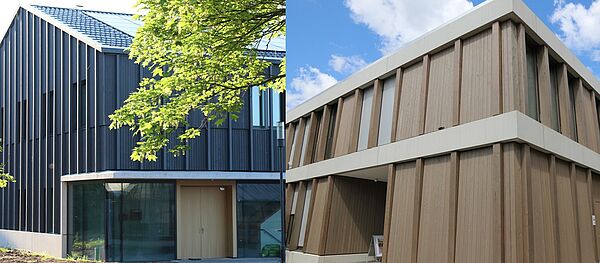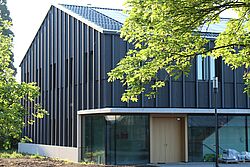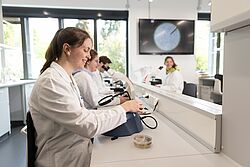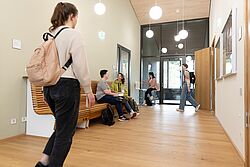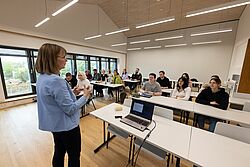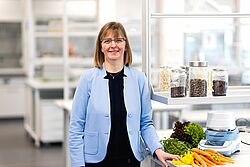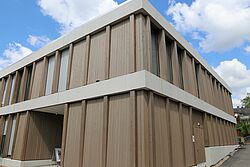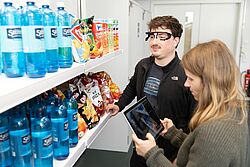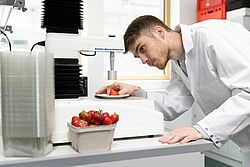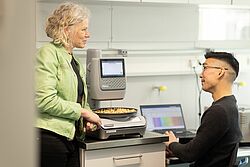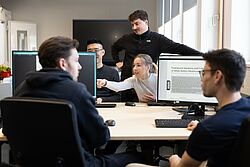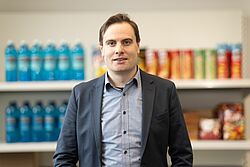Both buildings have three floors and are made up of lecture halls with modern digital equipment, seminar rooms, and fully-equipped laboratories, as well as technical spaces and offices dedicated to teaching and teaching-related research. All areas in the buildings are fully accessible and are equipped with modern low-temperature insulation, photovoltaic systems, and cisterns for collecting rainwater. The construction of these new buildings started back in 2021.
Two other campus buildings – a central lecture hall building and the new Beverage Technology Center – are now in the final phase of construction and scheduled for completion within the year. Construction has also started on a new research center, the Viticulture Adaption Center for Sustainability and Climate Change (VITA), which is scheduled to be finished in 2026.
Improving Teaching Facilities and Strengthening the University's Profile
"As a new type of university, we combine practical teaching approaches with application-oriented research across a broad range of subject areas, including viticulture, enology, the wine industry, beverage technology, food safety and logistics, horticulture, and landscape architecture. Our aim is to consistently develop and find solutions for central challenges, both present and future, in close cooperation with the relevant sectors. These new buildings will be especially significant as we work to achieve this aim, and will help strengthen the profile of Hochschule Geisenheim University even further," says Professor Hans Reiner Schultz, President of Hochschule Geisenheim University.
"The two newly opened buildings offer our students ideal conditions for praxis-relevant work and study. Practical skills can be taught in the laboratories, and new ideas can be tested right away. The buildings therefore play an important role in boosting the draw of our Food Safety and Food Chain Management degree programs," comments Mirjam Hey, Vice-President of Academic & Student Affairs at Hochschule Geisenheim University.
"We are also strengthening the development of sustainable standards and concepts across all degree programs through our interdisciplinary Professorship for Sustainable Use of Resources and Life Cycle Analyses for Special Crops, which will also have new, improved conditions in one of the two buildings," adds Mirjam Hey.
New Possibilities for the Food Safety Degree Programs
Professor Simone Loos-Theisen, Head of the Food Safety Degree Program and Deputy Head of the Department of Food Safety, emphasizes the importance of the new buildings for her field of study: "The new building is a real quantum leap for us, as it offers such great opportunities for teaching."
The Food Safety Building has two large laboratories dedicated to microbiology and food technology and analysis. Up to 20 students can be taught at one time in each of the bright, spacious rooms. The lecture halls on the second floor are equipped with the latest technology and can even be combined to form one large lecture hall when needed. There are also various lounge areas for students on the same floor. The basement level has additional space for storage, changing, and technology rooms. More information on the Food Safety degree programs is available via the following links: Food Safety (Bachelor), Food Safety (Bachelor - cooperative work-study program), Food Safety (Master)
Professor Andreas Holzapfel, Head of the Food Chain Management degree program and Head of the Department of Fresh Produce Logistics, is also enthusiastic: "The new building offers unique conditions, all of which grant Geisenheim's Food Chain Management students new opportunities. It also opens up opportunities for further developing the degree programs."
Influences on different stages of supply chains, from agricultural production all the way to the consumer, can be researched in the new seminar rooms and laboratories. For example, logistical processes and consumer behavior can be simulated by replicating a supermarket department. The effects of product, process, and supply chain factors, including packaging technology, on product quality, availability, and consumer behavior can also be researched. In computer areas with state-of-the-art hardware, students can realize complex simulations and optimizations of supply chains and use models and analyses to reduce the use of resources. More information on the Food Chain Management degree program is available here: Food Chain Management (Bachelor)
May 15, 2024: Open Day Showing the Diversity of the University's Degree Programs
Hochschule Geisenheim University will be presenting the entire spectrum of courses on offer at its open day, which will take place at the university campus on Wednesday, May 15, 2024, from 1 to 6 p.m. Prospective students can take part in taster lectures, individual counseling sessions, meetings with alumni, and tours of the campus and the various university buildings, among other events.
Invitation to Members of the Press
The two new buildings can also be viewed during the open day, and the Heads of the Food Safety and Food Chain Management degree programs and Vice-President Mirjam Hey will accompany the tour groups. The times for the viewings are as follows:
- Food Safety Building: May 15, 2:45–3:15 p.m.
- Logistics Building: May 15, 3:15–3:45 p.m.
If you are interested in coming to our campus for the open day on May 15 and taking part in touring the new buildings, we would be delighted to welcome you. Please let us know in advance for better planning.
Press Contact
Philipp Stieffenhofer
Tel: +49 6722-502-6201
E-mail: philipp.stieffenhofer(at)hs-gm.de
Marilena Schulte
Tel: +49 6722-502-6203
E-mail: marilena.schulte(at)hs-gm.de

